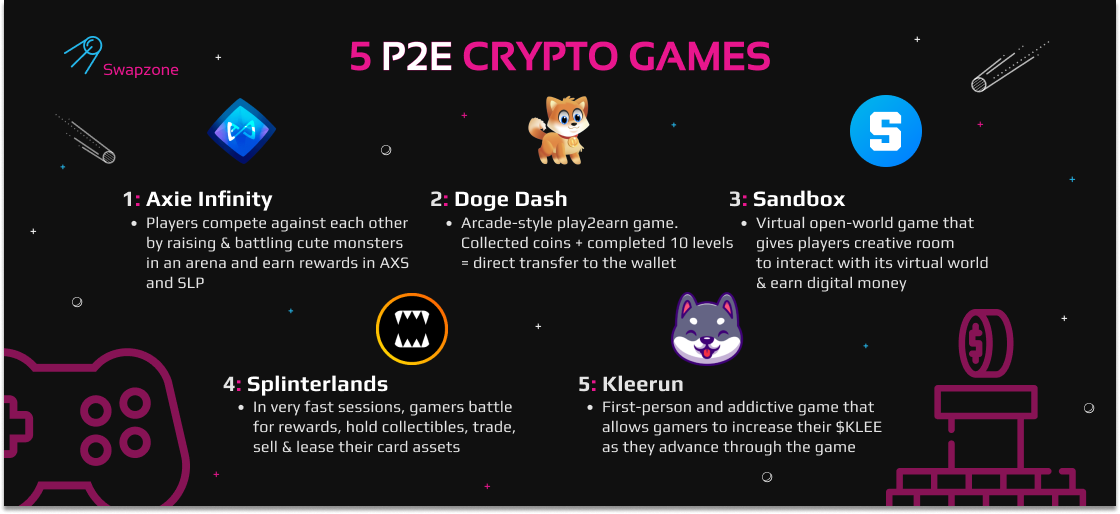How to play to earn rewards and boost your earnings with every play session
How to play to earn rewards and boost your earnings with every play session
Blog Article
Why Play-to-Earn Benefits Are Changing the Way You Play and Earn
The introduction of play-to-earn designs signifies a noteworthy change in the gaming landscape, welcoming gamers to check out not only the enjoyment value of video games but likewise their potential as income-generating platforms. Recognizing these dynamics raises pertinent questions concerning the future of pc gaming and the effects for both players and developers alike.
Development of Play-to-Earn Versions
In recent times, the pc gaming industry has observed a considerable makeover with the emergence of play-to-earn models, fundamentally altering exactly how gamers involve with electronic settings. This ingenious strategy allows gamers to gain tangible rewards through their in-game activities, developing a change from standard gaming paradigms where satisfaction and competition were the main inspirations.
Play-to-earn designs utilize blockchain modern technology and non-fungible tokens (NFTs) to offer gamers with possession of in-game assets, which can be traded or cost real-world money. Because of this, gamers are incentivized to spend effort and time into games, promoting a feeling of agency and economic chance. play to earn rewards. This change has brought in a diverse player base, consisting of those that might have formerly seen video gaming as a totally leisure activity
Several platforms have actually arised, showcasing effective implementations of this version, such as Axie Infinity and Decentraland. These systems have not just created considerable revenue however likewise sparked discussions around the sustainability and values of such economic systems. As play-to-earn designs proceed to develop, they promise to redefine the partnership in between players, designers, and the wider electronic economy, paving the method for a brand-new era in gaming.
Advantages for Gamers
As players engage with play-to-earn models, they open a series of benefits that extend past plain entertainment. One of the most substantial benefits is the capacity for financial rewards. Unlike standard gaming, where gamers invest money and time without tangible returns, play-to-earn systems permit gamers to make copyright or in-game properties that can be converted to real-world value. This financial motivation not only boosts involvement yet also fosters a feeling of ownership over the gaming experience.
In addition, play-to-earn designs promote neighborhood structure amongst players. Gamers typically collaborate to achieve common objectives, thereby cultivating social links that enrich the overall experience. This sense of neighborhood can lead to participating gameplay, where players share techniques and sources, boosting both individual and team success.
In addition, these versions can equalize access to gaming by allowing gamers from diverse financial backgrounds to benefit economically. By participating in play-to-earn ecosystems, people can obtain abilities and understanding concerning blockchain technology, more expanding their profession chances in the blossoming electronic economic situation. Inevitably, the benefits for players prolong well past gameplay, impacting their social, economic, and instructional landscapes positively.
Obstacles in the Environment
While the play-to-earn environment offers considerable opportunities, it is not without its obstacles. One significant problem is the volatility of in-game money and possessions, which can result in uncertain revenues for players. Changes in worth can deter prospective players that seek steady revenue streams - play to earn rewards. Furthermore, the intricacies of blockchain technology might confuse click for more info users unknown with electronic money, producing obstacles to entrance.
An additional obstacle is the danger of frauds content and deceitful schemes that can plague the community. Players may experience misleading systems assuring high benefits yet ultimately bring about financial loss. Making sure count on and security is vital for the long-lasting stability of play-to-earn designs.
Moreover, the environmental effect of blockchain gaming can not be overlooked. The power usage linked with mining and deal handling raises ethical inquiries concerning sustainability. Game developers should find an equilibrium between gratifying players and lessening eco-friendly footprints.
Lastly, the regulatory landscape is still evolving, positioning prospective threats for programmers and gamers alike. Uncertain lawful frameworks can impede innovation and limit the development of play-to-earn ecosystems. Attending to these obstacles is vital for realizing the complete possibility of this transformative pc gaming paradigm.
The Function of Blockchain Modern Technology
Blockchain technology serves as the backbone of the play-to-earn community, resolving a lot of the obstacles formerly laid out. By utilizing decentralized ledgers, blockchain guarantees transparency and safety in transactions. Gamers can confidently gain and trade in-game possessions, recognizing that ownership is verifiable and not subject to control.

Tokenization of assets plays a crucial duty, providing players real ownership of their in-game products, which can be purchased, marketed, or traded on numerous industries. This urges a vivid additional market, where gamers can monetize their skills and time invested in the game.
Furthermore, blockchain innovation allows interoperability in between various video games and systems, permitting gamers to bring their possessions throughout numerous communities. This flexibility not only improves individual experience however likewise promotes an extra inclusive video gaming setting, eventually reshaping the landscape of gaming and earning.
Future Fads in Gaming
The pc gaming industry gets on the verge of a transformative development, driven by emerging technologies and changing gamer assumptions. As play-to-earn versions gain grip, gamers are significantly seeking immersive experiences that mix basics enjoyment with substantial incentives. This shift is triggering designers to introduce, focusing on producing interesting gameplay that cultivates area and communication.
One significant pattern is the assimilation of virtual truth (VIRTUAL REALITY) and augmented reality (AR), enhancing the gaming experience by giving deeper immersion and interactive atmospheres. In addition, innovations in expert system are allowing extra sophisticated non-player personalities (NPCs) and flexible gameplay, customizing experiences to individual gamer choices.

Final Thought
In verdict, the play-to-earn version is considerably changing the gaming landscape by enabling gamers to acquire real-world worth from their in-game activities. This paradigm shift not just enhances player engagement and investment however additionally raises challenges that need to be dealt with to ensure sustainability within the ecological community. As blockchain modern technology remains to help with ownership of electronic properties, the future of video gaming assures more development and opportunities for gamers throughout diverse backgrounds.
Report this page